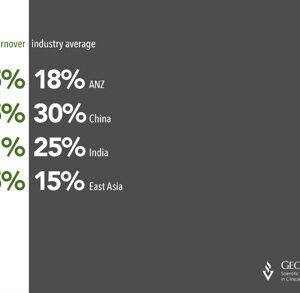
The cost of employee turnover in a Clinical Research Organisation (CRO) is high, as it weakens the relationship with the project sponsor. Research shows that in 2012, the CRO industry in the United States experienced a 12.5% voluntary turnover, compared to an average national voluntary turnover rate of 1.5%.
During the 2015 financial year, 乔治临床( George Clinical ) (GC) is pleased to announce that it maintained a staff turnover rate that was below industry average, evident in the figure above. With offices in the Asia-Pacific, United States and Europe, GC strives on creating a positive work environment, building constructive relationships with line managers and constant motivation to succeed – these areas has contributed to this outcome.
Furthermore, GC Australia and New Zealand achieved a significantly lower voluntary staff turnover at 4.55% in comparison to the industry average of 18%. Although China experienced the highest voluntary staff turnover rate at 25%, it is below the industry average of 30% – the China CRO sector is notorious for high turnover. GC India held a voluntary staff turnover of 21.43%, where the industry average is 25%; and the offices in GC East Asia experienced a 5.26% voluntary staff turnover in contrast to the industry average of 15%.
Having a stable team of personnel allows GC to focus on quality operational services. Lower staff turnover means that more time is spent on operational delivery rather than managing personnel changes.


